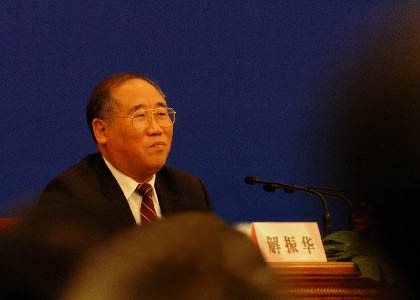| China's Policies and Actions to Address
Climate Change
By XIE ZHENHUA
XIE ZHENHUA is vice minister of the National Development and Reform Commission. He has been engaged in the management of environmental protection, energy conservation and emission reduction, and climate change response for many years. In recent years he has served as the head of the Chinese delegation in international negotiations on the United Nations Framework Convention on Climate Change and its Kyoto Protocol.
GLOBAL warming is the main feature of climate change. Climate change is related to human survival and the well-being of all countries and as such poses a great challenge to mankind in the 21st century. Joint efforts by the international community are needed to deal with it. A large developing country with a huge population, complex climatic conditions and a fragile ecological environment, China is most vulnerable to the adverse impacts of climate change. Climate change seriously threats the living environment and development conditions of many regions in China. Food security, water resources, ecology and energy sources are all affected. An energetic response to the climate change challenge is a strategic requirement for China’s realization of sustainable development.
China's Stance
The problem of climate change arose during the development of the modern age, and must be solved within issues of sustainable development. The international community should, within a sustainable development framework, coordinate factors such as economic development, poverty elimination and climate protection if it is to achieve the dual goals of modernizing and addressing climate change. Owing to differences in developmental stages, historic responsibilities and current capabilities, the various countries engaged in the process of solving climate change should be governed by the principle of “common but differentiated responsibilities.” The developed countries discharged large quantities of greenhouse gases without restriction for more than two centuries of industrialization, and their present per-capita emission levels are much higher than those of the developing countries. Meanwhile, they have powerful economies and advanced low-carbon technologies. Therefore, they should shoulder responsibility for substantial emission reductions, and support the developing countries with financing, technology transfer and capability building. The developing countries, trying to diversify their economies and eliminate poverty, with support from developed countries, should take active measures to effectively adapt to and slow down climate change.
The United Nations Framework Convention on Climate Change (Convention) and its Kyoto Protocol (Protocol) are the basic framework and legal foundation of international cooperation in responding to climate change. They are an embodiment of the consensus of the international community, and the basis and guide to action according to the Bali Roadmap. In international negotiations on climate change, the status of the Convention and its Protocol should remain central, the mandate of the Bali Roadmap should be followed, and equal consideration should be given to mitigation and adaptation, technology transfer and financial support. The Cancun Conference should continue the dual-track negotiating mechanism that was based on the Convention and its Protocol, determining as soon as possible the emission reduction targets of developed nations that are parties to the Kyoto Protocol for the Second Commitment Period. Developed countries that are not parties to the Protocol should be urged to undertake reduction targets comparable to other developed countries under the framework of the Convention, and tackle the issues of mitigation, adaptation, finance and technology transfer. Critical to the success or otherwise of the Cancun Conference is whether or not the developed countries can fulfill the fast-start fund of US $30 billion they promised at the Copenhagen Conference and whether the international community can establish mutual trust. To lay a solid foundation for the completion of the Bali Roadmap negotiations, the Cancun Conference should adhere to the principles of openness and transparency, broad participation, and consensus through consultation and be party-driven, while consolidating the progress and consensus achieved in mitigation, adaptation, finance, technology transfer and capability building.
|


